
Living in a landed home is an aspiration for many here, but with rising land costs and housing prices, this asset class remains out of reach for the average Singaporean. However, here’s some food for thought: would it make sense to rent a landed home for own-stay purposes?
According to the latest data released by the URA, the rental index for landed properties fell by 0.9% quarter-on-quarter (q-o-q) in the second quarter of 2024. Meanwhile, the average monthly rent of high-end non-landed properties also softened by 1.6% q-o-q, marking the fourth consecutive quarter of decline. These decreases are underpinned by the increased stocks of private residential units for rent across the island.
As rents fall, demand is starting to pick up, leading to a rise in leasing volumes.
In this article, we discuss the differences between renting a condo and renting a landed property, as well as diving into the costs and gains of renting versus purchasing a landed property. Our objective is to assess whether renting a landed property in Singapore is a sensible choice in the current market, especially with falling rents.
Renting a Landed Property VS Condo
Distinct Characteristics of Condo and Landed Property
The primary difference between renting a landed property and condo lies in the lifestyle they offer to tenants. Landed properties, which include terrace houses, semi-detached houses, detached bungalows, and cluster houses, provide tenants with full private and exclusive access to the land the house sits on. This grants a greater degree of privacy and space, as well as the freedom to make alterations to the property within landlords’ approvals and regulatory guidelines.
This secluded living environment, however, comes with higher cost and responsibility relative to condo, such as maintenance and security, which fall solely on the tenant.
On the other hand, condos offer a vastly different lifestyle with shared amenities and facilities. One of the main attractions of condo living is access to communal amenities, such as swimming pools, gyms, tennis courts, and BBQ areas, which are maintained by the management corporation. Tenants who are interested in renting condos also do not have to worry about personal arrangement for security as condos are highly secured with gated access, surveillance, and security personnel.
Location and community also play significant roles when deciding between landed properties and condos. Condos are often located near retail amenities and MRT stations/bus stops. In contrast, landed properties are typically found in quieter, secluded neighbourhoods or exclusive enclaves, offering a more serene and private environment. This distinction makes landed properties particularly appealing to those who prefer a quieter and peaceful environment.

Comparison of Rental Price PSF for Condos and Landed
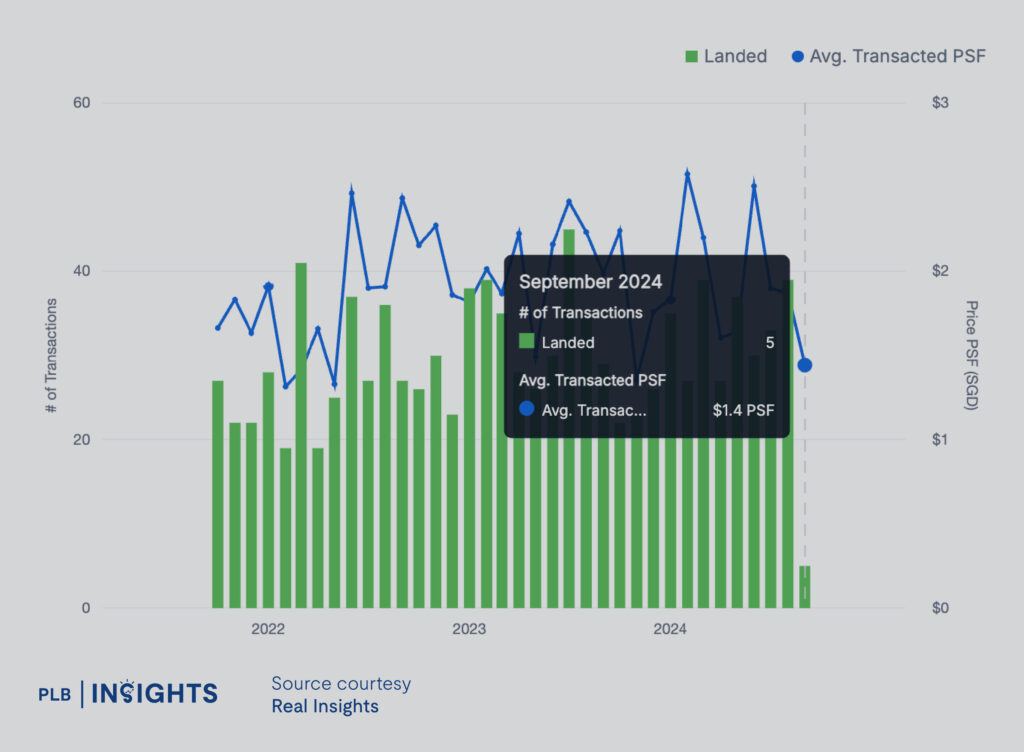
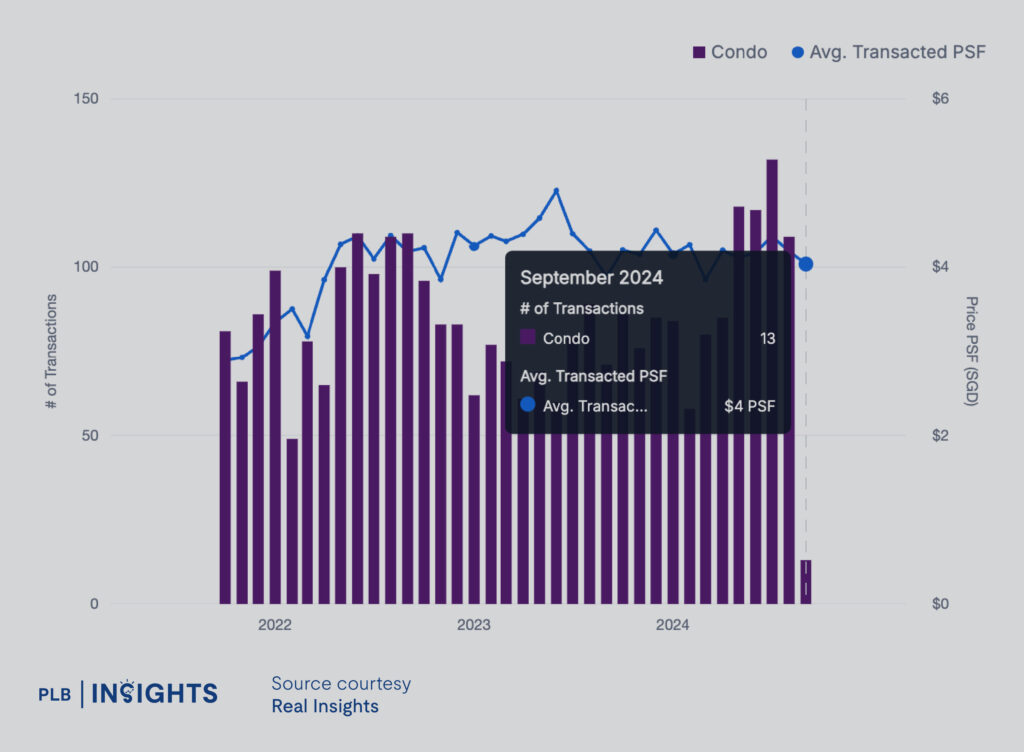
Note: For consistency, we will keep the analysis and discussions focused on District 28 (D28)
In September 2024, the average transacted rental price per square foot (PSF) for landed homes in D28 was $1.40 PSF. In contrast, the average transacted PSF for condos in the same district was significantly higher at $4.00 PSF. This stark difference highlights the premium placed on condo amenities.
However, due to the larger size of landed homes, their average transacted rental price was naturally higher at $6,070 per month, compared to $3,508 per month for condos in D28. A quick search on real estate portals on 17 September 2024, showed that rental prices for landed homes in D28 ranged between $6,200 and $6,800 per month for properties sized between 4,300 and 6,800 square feet, including both land and built-up area. In comparison, condos in D28 were renting for approximately $3,500 per month for units around 900+ square feet.
This comparison illustrates that while the PSF price of renting a condo is higher, the overall rental price of landed properties reflects their larger space, making them more suitable for those who prioritise size and privacy over amenities and convenience.
Ultimately, the choice between a landed property and a condo in Singapore depends on individual preferences, lifestyle needs, and budget considerations. Landed properties cater to those seeking space, privacy, and autonomy, while condos appeal to those who value convenience, security, and access to modern amenities. Each option presents its own set of advantages and differences, making it essential to weigh these factors carefully when deciding where to live.
Case study: Renting vs Purchasing a Landed Property
Assuming Sam wishes to rent a landed property in D28, it would require an average of $6,500 per month based on current listings on real estate portals, which amounts to approximately $78,000 per year.
Sam and his family are currently staying in a condominium in D19 (Punggol/Sengkang area). The current condominium is valued at $1.5 million, and rental for their apartment could fetch approximately $4,500.
Scenario 1: Renting the Landed Home
If Sam decides to rent the $6,500 landed home, he could fund part of the rental costs by renting out his condo at $4,500 per month. This would result in an additional $2,000 required out of pocket per month, amounting to $24,000 per year (excluding other maintenance costs).
Buying the Same Landed Property
Scenario 2: Selling the Condo and Buying the Landed Home
To put things into better perspective, it is useful to break down the costs if Sam sells his condo to upgrade to the $6 million landed home in D28. We compared the costs associated with both options over a defined period of 10 years. Key factors to consider include purchase costs, rental costs, mortgage payments, property taxes, maintenance, and potential capital appreciation. We have made several assumptions as followed:
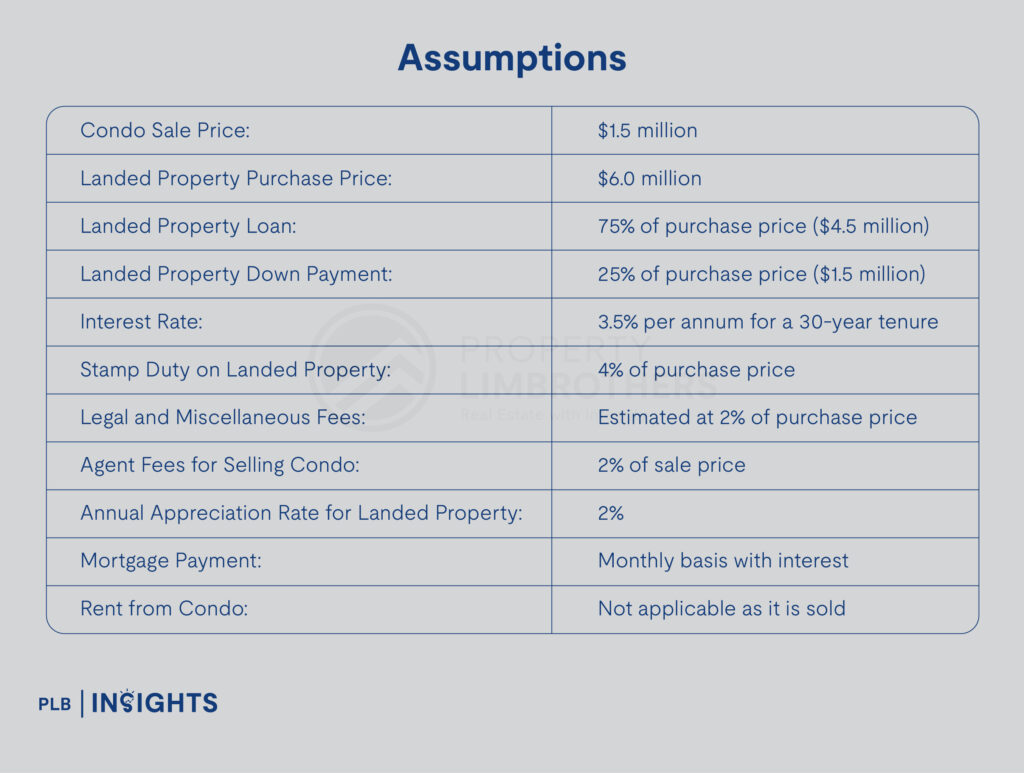
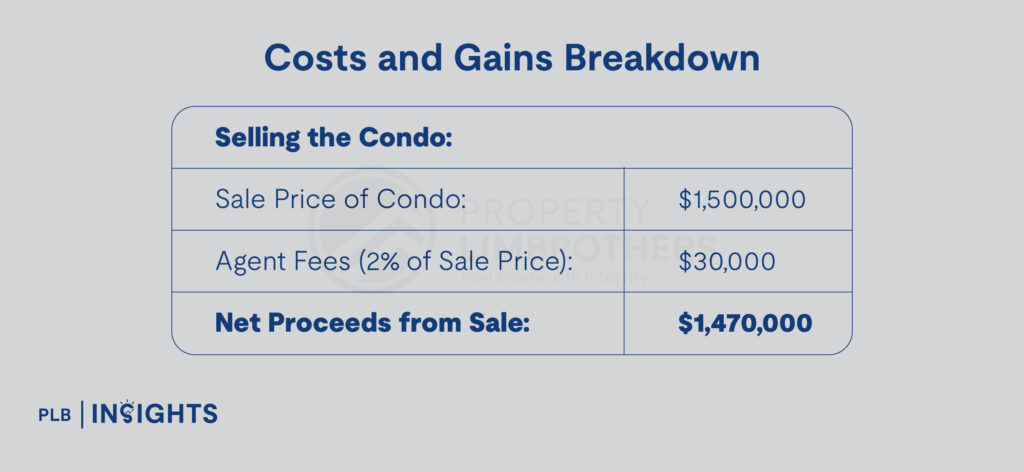
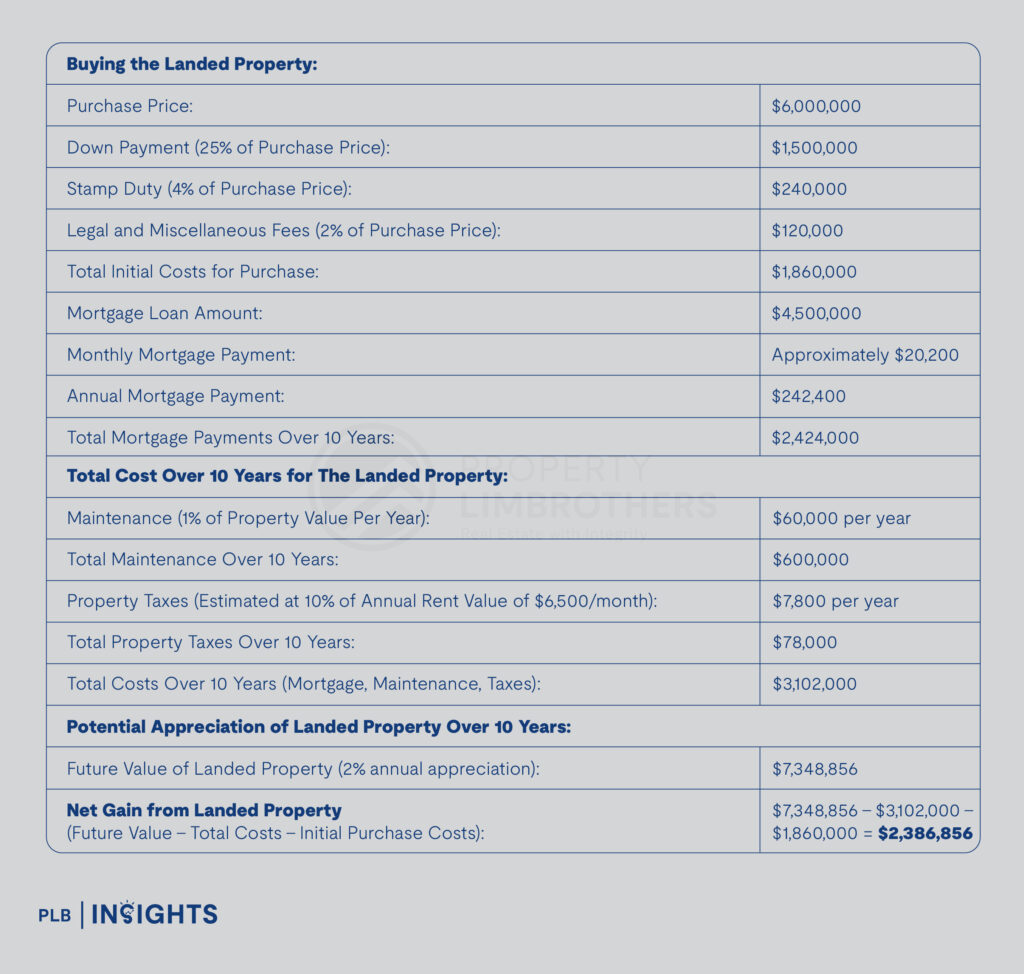
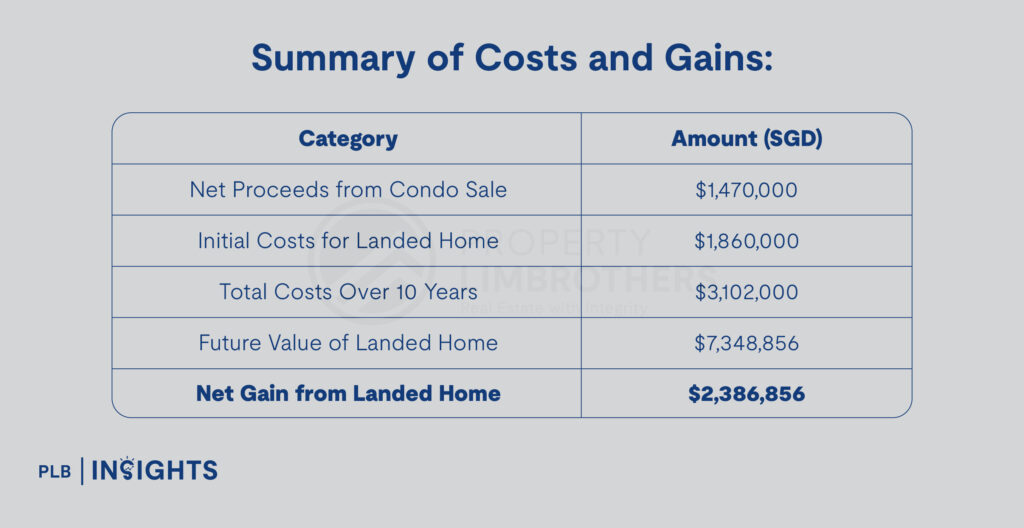
By selling the $1.5 million condo and using the proceeds towards purchasing the $6 million landed property, Sam would incur significant costs initially and over the 10-year period. However, the appreciation of the landed property provides a substantial net gain of approximately $2.39 million. This scenario shows that while the initial outlay is high, investing in the landed property could be financially beneficial in the long term due to potential appreciation. But of course, this is only possible if Sam and his family have sufficient savings to fund the initial outlay.
Final Thoughts
Choosing to rent a landed property or upgrading (in Sam’s case, by selling a condo and purchasing a landed property) really depends on individual preferences, financial situation, and risk appetite. Although upgrading from a condo to a landed property may make sense due to the higher potential capital appreciation of landed properties, as seen in recent market trends, one needs to consider the associated hefty costs outlined above.
If the budget is constrained, renting a landed property is also a feasible option, though rental costs remain subject to market conditions and occasional fluctuating price movements.
We understand that navigating the property market can be complex, especially with its ever-changing cycles. That’s why we’re dedicated to providing you with the most up-to-date information to help you make informed decisions. Whether you’re a first-time homebuyer, an experienced investor, or just exploring your options, our team of consultants is here to guide and support you through every step of the process.
Disclaimer: Information provided on this website is general in nature and does not constitute financial advice
PropertyLimBrothers will endeavour to update the website as needed. However, information may change without notice and we do not guarantee the accuracy of information on the website, including information provided by third parties, at any particular time. While every effort has been made that the information provided is accurate, individuals must not rely on this information to make a financial or investment decision. Before making any, we recommend you consult a financial planner or your bank to take into account your particular financial situation and individual needs. PropertyLimBrothers does not give any warranty as to the accuracy, reliability or completeness of information which is contained in this website. Except insofar as any liability under statute cannot be executed, ProperyLimBrothers, its employees do not accept any liability for any error or omission on this website or for any resulting loss or damage suffered by the recipient or any other person.







